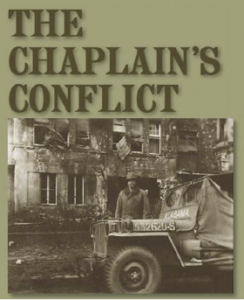 A Tribute to Renwick C. Kennedy
A Tribute to Renwick C. Kennedy
The popular television series, M*A*S*H, brought America’s public face-to- face with one of the most engaging elements of citizen soldiery – life inside an evacuation hospital. But it’s today’s reruns that are unsettling to historian Tennant McWilliams.
“… while this noted fictional evac lives on, the historical evac of World War II, Korea and Vietnam… is dead,” he said.
This became a reality when McWilliams read and thoroughly researched the war diaries of ARP Minister Renwick C. Kennedy. This resulted in The Chaplain’s Conflict, which delivers an honest look at actual day-to-day life in a real-life WWII Army evacuation hospital. Kennedy’s story goes deeply and fairly into the most funda- mental issues of war.
McWilliams first met Kennedy in 1961, when he visited an uncle in Oak Hill, AL. When he arrived, Kennedy was rocking on the front porch with Uncle Bill. Following introductions, Rev. Kennedy spoke with McWilliams briefly. “I recall his stature that day as just under six feet,” McWilliams said. “I also remember his accent – a rounded blend of Old South and Ivy League.”
After Kennedy left, McWilliam’s uncle showed him a post-WWII article by Ken- nedy in a 1940s issue of Time Magazine. It was a scathing criticism of certain Army behaviors during WWII, which fitted into a slowly bubbling-up realism about “the war.” Uncle Bill remembered how – in December 1945 – Kennedy sat in the same rocker on his porch, trying to sort out his recent life as a chaplain in the 102nd Army Evacuation Hospital. His tour of duty as an Army chaplain had taken him from Normandy to the Battle of the Bulge and on to the liberation of Germany.
When Kennedy died, he left McWil- liams all his papers – 5,000 letters, plus sermons and diaries with detailed recordings on how his world as a US Army chaplain unfolded each day. “Through his letters and diaries, this scholarly preacher had recorded in striking real- ism what he had experienced with the 102nd Evac,” McWilliams said. “By comparison, this made the unit’s official records in the National Archives at best a skeletal, if still crucial account.”
Following Kennedy’s Footsteps
An intellectual as well as a minister, Kennedy was compulsively fascinated with war and perplexed by its implications for good and evil, not just for the world abstractly, but also for himself concretely. After reading more and more of the diaries, McWilliams and wife, Susan, decided to venture to Europe retracing not only the basic trail of the 102nd through Europe, but also every village, schoolhouse, chateau, and muddy intersection – not to mention every stone wall, pasture and orchard.
During a full year of uninterrupted work, they found elderly locals who where eager to share their remembrances, down to specific doctors of the “American tent hospital” – especially in saving the lives of local children. One resident produced a diary showing an entry: “Captain Kennedy from Alabama sat with us in front of the fireplace in the grand salon and listened as we talked about German atrocities that ended only as the Americans liberated our village.”
The evac diary McWilliams shared moved some to laughter, others to stoic analysis and still others had no words at all – just tears. Regardless of age, these people embraced Captain Kennedy’s chronicles as one more reminder of war’s reality and of citizen-soldiers from America, who had liberated Europe some 50 years ago.
“For Ren, and indeed for any sane human in touch with the personally philosophical nature of war – it also was ‘the chaplain’s conflict,’” McWilliams said.
ARP Minister Goes to War
Ren Kennedy was the product of a storied South Carolina family and Pres- byterian leaders dating back to the Scottish Reformation. He was the son of an ARP minister, and was himself an ac- tive ARP minister for nearly 50 years.
He attended Erskine College, and went on to Princeton Theological Seminary. He accepted a pastorate at Camden ARP Church in south Alabama in 1927, married, and a started a family. McWilliams said his Wilcox County ministry connected him with people from all walks of life, preparing him for what lay ahead.
He also traveled from Camden to Prosperity ARP in Marion Junction, AL, on the second Sunday of each month. And he assumed the pastorate of Bethel ARP in Oak Hill, AL in 1953. He served as clerk for the TN/AL Presbytery for 36 years.
“He was a very unique individual,” said Jane Shelton Dale of Camden, AL. “I’m glad I grew up with him as my minister. Many people who grew up in the church before me – some the age of his children, have commented that they never had any idea what he experienced during the war, until they read McWilliam’s book.”
Finally, out of modern Christian values, civic duty, and longing for overseas adventure, he wanted to be in the US Army, targeting fascism. In the year prior to joining the Army, he laid out his moralism about war in a guest sermon at the Oak Hill ARP Church titled, “The Christian and the War.”
In it he said, “ … In war, nothing whatsoever is sacred and anything at all may be violated… Jesus said killing is a sin, and war is the supreme collec- tive sin of the human race… The State is waging the war, not the church, and I am a citizen of the State… If American entry into the war violates Christian- ity, the alternative promises to violate it still more, and I choose between the two evils and support the war.”
He also preached that WWII was not God’s will, but it was his judgement – coming inexorably upon men who violated his spiritual laws. “He sees how horrible war is, but he saw it was necessary to kill to combat the evil of Hitler,” McWilliams said.
The Final Days
In March of 1945, after allies took Remagen Bridge, and the US troops took Ludendorff Bridge, the 102nd was set up in the former Kurhaus Hotel in Bad Neuenahr, Germany. Chaplain Ken- nedy methodically visited casualties in wards and offered Sunday services. His duties ran the gamut from counseling soldiers on pending divorces to those being sent home for “homosexuality.” Like most, he witnessed constant dev- astation and death around him.
His commanding officer had told him on several occasions how valuable his counsel was on various issues. An efficiency report read: “A sincere, understanding officer with an outstanding sense of diplomacy, capable of handling the most delicate situations… gaining him respect and admiration of all persons contacted.”
On March 28, the end of the war was prematurely announced. With Easter Sunday coming soon, Kennedy optimis- tically reviewed a sermon he had writ- ten in April, 1941, for his Camden, AL, church. He decided to preach the same sermon for the Easter Sunday service. It was a standard, but eloquent “Ken- nedy talk,” McWilliams said, about the reality of resurrection, not vague hope framed by Matthew 28:6 and Judges 13:23, and interlaced with humanistic quotes from Shakespeare.
Later, Kennedy wrote, “… one of the best services I have ever had in the Army.” That afternoon he went sightseeing in Bonn, visiting the home of Ludwig von Beethoven before return- ing to the Kurhaus via new pontoon bridges across the Rhine at Remagen. “… peach, pear, plum, pansies, violets, shrubs were in bloom.” Compared to recent circumstances, Easter 1945 “was indeed good.”
But the final days of fighting in Germany lasted from April through October. On May 8, the radio brought news of the surrender of Germany. V Day in Europe brought speeches from Churchill and a Victory Day celebration, but did little to dim the war’s reality: “… four deaths in the 102nd hospital in the last few days…” his war diary read.
Then came the liberated POWs from every army imaginable. The most unusual counseling during this time was with six men who were accused of raping two girls ages 14 and 18 at Bad Neuenahr. Kennedy spent hours with the men, first in his office, then at the stockade, seeking truthful information and counseling them on the legal proceedings they were facing.
Then, “a boy from Arkansas with a complex personality,” confessed he was guilty of both rapes. He claimed he committed the crime because people believed he was a homosexual, when he was not. Two days later, he “somehow stole a pistol and shot himself in the heart – dead,” the diary reads.
There are records of so many atrocities Kennedy had to deal with as a chaplain. He saw a lot of sad and tragic things, but he never missed an opportunity to savor the surrounding non-Army scene – accepting invitations from others to take part in activities off base.
At first he traveled by train, but soon found himself in possession of a chaplain’s jeep and trailer. The jeep was quickly dubbed Alabama. The vehicle took he and his buddies on regular road trips, including iconic points of London, and his favorite jaunt into Shakespeare territory.
Coming Home
Sunday, November 25, 1945, Kennedy returned to his pulpit and a packed house at Camden (AL) ARP Church. After emphasizing how important it was for “democratic Christians” in the US not to make the same mistakes in the post-WWII era that had been made after WWI, he explained that due to his “leave of absence,” the congregation was due a “report.”
Ten-year-old Betty Gaines sat two rows from the front that Sunday with her friends. Fifty years later she recalled, “…we were at an irreverent age, just little hell-raisers in a small town, with no comprehension of serious mat- ters. But when he got to the part where he said something about sparing us the horrible details of death, his voice quivered, and he stared down right at us. I’m telling you, we understood that something serious and horrible had happened.”
Kennedy later stated, “I don’t know what the war has done to me, but I do not regret it.” For the next 30 years, he pastored the ARP churches of Camden, Marion Junction, and Oak Hill. However, he always missed the GIs he served with and their surrounding world of war.
In 1970, at age 70, plagued by em- physema, he retired first from academic life at Troy State College, where he had gone from a part time teacher to executive assistant to the president – with lobbying duties in Montgomery. He still did not want to stop being a minister. “He just wanted to be a part of an environment with far more daily talk about great books and compelling ideas…,” McWilliams said. Four years later, he retired from the pulpit. He died of cancer in 1985.
“The chaplain’s conflict over the war – how he struggled with its good and evil, and related tension between happiness and sadness and logic and emotion – forced this already beauti- fully educated man to grow into a more worldly and sophisticated human,” McWilliams said.
